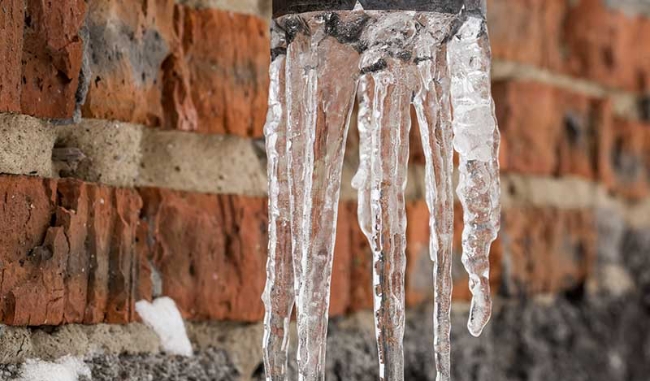Tips to Keep Pipes from Cold Weather Damage: Essential Tips
Tips to Keep Pipes from Cold Weather Damage: Essential Tips
Blog Article
They are making several good observations on Prevent Frozen Pipes in general in the article which follows.

Cold weather can damage your pipes, particularly by freezing pipes. Below's just how to stop it from occurring and what to do if it does.
Introduction
As temperatures decline, the threat of icy pipelines boosts, possibly bring about pricey repairs and water damage. Comprehending how to avoid icy pipelines is critical for home owners in cool climates.
Understanding Frozen Pipes
What creates pipes to ice up?
Pipelines ice up when subjected to temperatures below 32 ° F (0 ° C) for expanded durations. As water inside the pipes freezes, it increases, taxing the pipe wall surfaces and possibly triggering them to break.
Threats and damages
Icy pipes can lead to water supply interruptions, residential property damage, and costly repair work. Burst pipes can flooding homes and cause considerable structural damages.
Indications of Frozen Pipeline
Determining icy pipes early can stop them from rupturing.
Exactly how to recognize icy pipes
Try to find reduced water circulation from taps, unusual odors or noises from pipes, and visible frost on subjected pipelines.
Avoidance Tips
Shielding vulnerable pipelines
Wrap pipelines in insulation sleeves or use warmth tape to protect them from freezing temperature levels. Concentrate on pipelines in unheated or outside areas of the home.
Heating techniques
Maintain indoor spaces sufficiently heated, especially areas with pipes. Open up closet doors to enable cozy air to flow around pipes under sinks.
Safeguarding Outside Pipes
Yard tubes and outside faucets
Separate and drain pipes yard pipes before winter. Mount frost-proof spigots or cover outdoor taps with insulated caps.
What to Do If Your Pipelines Freeze
Immediate actions to take
If you presume frozen pipes, maintain faucets open up to ease stress as the ice melts. Make use of a hairdryer or towels soaked in hot water to thaw pipelines gradually.
Long-Term Solutions
Structural modifications
Take into consideration rerouting pipelines away from exterior wall surfaces or unheated locations. Add additional insulation to attics, basements, and crawl spaces.
Updating insulation
Purchase top quality insulation for pipes, attics, and walls. Proper insulation helps keep consistent temperatures and decreases the threat of icy pipelines.
Conclusion
Avoiding icy pipes requires positive steps and quick responses. By recognizing the causes, signs, and preventive measures, homeowners can protect their pipes during cold weather.
Helpful Tips to Prevent Frozen Pipes this Winter
UNDERSTANDING THE BASICS: WHY PIPES FREEZE AND WHY IT’S A PROBLEM
Water freezing inside pipes is common during the winter months, but understanding why pipes freeze, and the potential problems it can cause is crucial in preventing such incidents. This section will delve into the basics of why pipes freeze and the associated problems that may arise.
THE SCIENCE BEHIND FROZEN PIPES
When water reaches freezing temperatures, it undergoes a physical transformation and solidifies into ice. This expansion of water as it freezes is the primary reason pipes can burst. As the water inside the pipe freezes, it expands, creating immense pressure on the walls. If the pressure becomes too great, the pipe can crack or rupture, leading to leaks and water damage.
FACTORS THAT CONTRIBUTE TO PIPE FREEZING
Low Temperatures: Extremely cold weather, especially below freezing, increases the risk of pipes freezing. Uninsulated or Poorly Insulated Pipes: Pipes located in unheated areas, such as basements, crawl spaces, or attics, are more prone to freezing. Insufficient insulation or lack of insulation altogether exacerbates the problem. Exterior Wall Exposure: Pipes running along exterior walls are susceptible to freezing as they encounter colder temperatures outside. Lack of Heating or Temperature Regulation: Inadequate heating or inconsistent temperature control in your home can contribute to frozen pipes. PROBLEMS CAUSED BY FROZEN PIPES
- Pipe Bursting: As mentioned earlier, the expansion of water as it freezes can cause pipes to burst, resulting in significant water damage.
- Water Damage: When pipes burst, it can lead to flooding and water damage to your property, including walls, ceilings, flooring, and personal belongings.
- Structural Damage: Prolonged exposure to water from burst pipes can compromise the structural integrity of your home, leading to costly repairs.
- Mold and Mildew Growth: Excess moisture from water damage can create a favorable environment for mold and mildew growth, posing health risks to occupants.
- Disrupted Water Supply: Frozen pipes can also result in a complete or partial loss of water supply until the issue is resolved.
WHY CERTAIN PIPES ARE MORE PRONE TO FREEZING
- Location: Pipes located in unheated or poorly insulated areas, such as basements, crawl spaces, attics, or exterior walls, are at higher risk of freezing.
- Exterior Pipes: Outdoor pipes, such as those used for irrigation or exposed plumbing, are particularly vulnerable to freezing as they are directly exposed to the elements.
- Supply Lines: Pipes that carry water from the main water supply into your home, including the main water line, are critical to protect as freezing in these lines can affect your entire plumbing system.
- Underground Pipes: Pipes buried underground, such as those connected to sprinkler systems or outdoor faucets, can be susceptible to freezing if not properly insulated.
https://busybusy.com/blog/helpful-tips-to-prevent-frozen-pipes-this-winter/

As an enthusiastic person who reads about How to Prevent Your Pipes From Freezing, I was thinking sharing that piece of content was smart. Sharing is good. Helping people is fun. Thanks a lot for taking the time to read it.
Schedule Now! Report this page